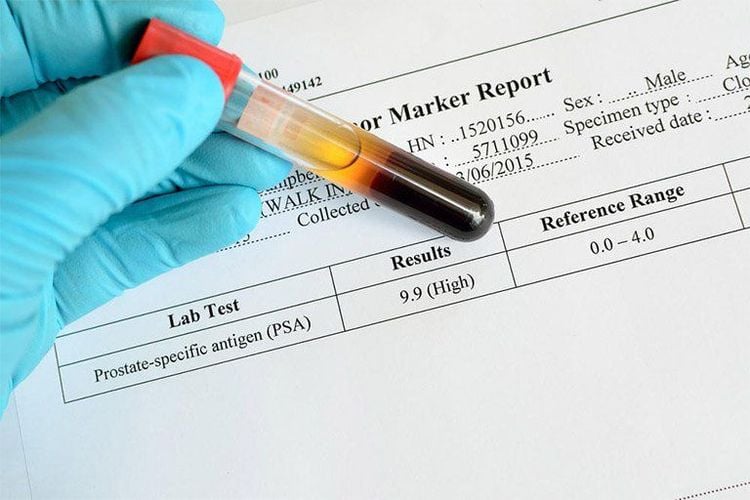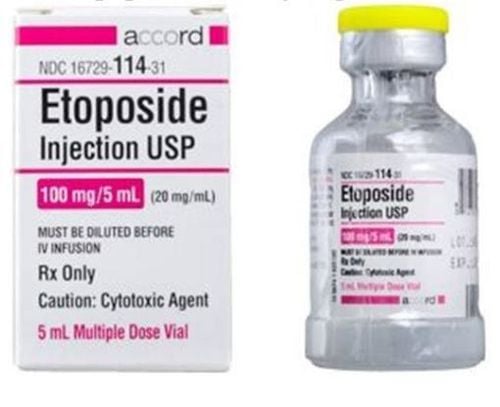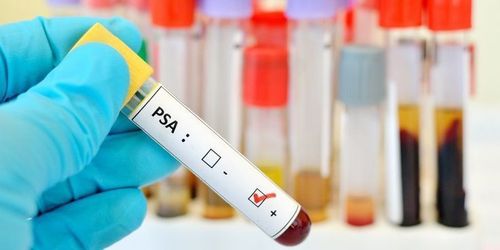This is an automatically translated article.
Prostate surgery is a common method of cancer treatment. After surgery, the patient will be tested for prostate-specific antigen (PSA) to check for signs of cancer recurrence. So why is a PSA test necessary after a prostatectomy?
1. The role of PSA test after prostatectomy
Prostate-specific antigen (PSA) cells produce a protein at low levels in the blood, called prostate-specific antigen (PSA), which is encoded by the KLK3 gene. Similarly, malignant prostate cancer cells also produce PSA, even more so than benign cells. The molecular mass of PSA is usually between 30,000 - 34,000 daltons. PSA is mainly found in semen, but also in small amounts circulating in the blood and in very low concentrations in plasma. Your doctor uses a blood test to check your PSA, as well as your free PSA/total PSA ratio. If this protein is present in high levels in the blood, the prostate may be experiencing problems with abnormalities, including cancer.
One of the treatments for prostate cancer is radical resection, which means the doctor removes the entire prostate gland and some nearby tissue. Although the prostate gland has been completely removed, some cancer cells may still be left behind or mixed in with surrounding tissues. If these malignant cells continue to multiply, prostate cancer will return. According to a 2013 study, the rate of prostate cancer recurrence within 10 years after surgery is about 20-40%.
First, the PSA test helps doctors detect and treat prostate cancer early. After that, patients need to have PSA tests regularly after surgery to check whether the cancer cells have been successfully eliminated, and also to screen for cancer recurrence.

Xét nghiệm PSA giúp các bác sĩ phát hiện và điều trị ung thư tuyến tiền liệt sớm
2. Meaning of test results
The unit of measurement for PSA is nanograms per milliliter of blood (ng/mL). PSA levels will change over time and tend to increase with age. There are also slight differences between individuals.
According to the Prostate Cancer Foundation, PSA levels within the normal range based on age are:
40 - 49 years: 0 - 2.5 ng/mL 50 - 59 years: 0 - 4 ng/mL 60 - 69 years old: 0 - 4.5ng/mL 70 - 79 years old: 0 - 6.5ng/mL Some Vietnamese studies show that the normal value of PSA in plasma is < 4 ng/ml.
The American Cancer Society recommends that men get a PSA test about 6 to 8 weeks after the completion of prostatectomy. If PSA measurement is performed earlier than 6 weeks, modern tests today can still detect PSA levels in the blood, even in very small concentrations. After the initial visit, the patient should repeat the prostate cancer PSA test every 6 months.
In general, a patient's PSA level is usually very low after treatment. In many cases, PSA levels cannot even be detected in the blood. Specifically, 21 days after total prostatectomy, PSA should be 0 or less than 0.05 ng/ml. However, testing for PSA after surgery does not mean that the cancer will return, and vice versa. Normal cells are still naturally capable of making PSA. Although it is a prostate-specific antigen, PSA is not a specific antigen for this type of cancer.
For some people, high levels of PSA in the blood are not caused by cancer cells. Other factors also affect PSA levels, such as:
Advanced age Prostate size Race Drug use. These factors and previous test results will be taken into account to diagnose the risk of the cancer coming back.
The doctor also needs to know the rate of increase of PSA in the blood over time to give further advice and recommend other treatments if necessary. To know the rate of increase of PSA, patients need to have regular prostate cancer PSA test. If PSA levels remain stable or rise very slowly, no further treatment is usually needed.
3. Are other tests needed?
Recommending further treatment is usually not based on a single PSA test result, the patient needs periodic and frequent follow-up with many other tests.
Measurement of PSA is only one way to check the health of a patient after prostatectomy. Other imaging techniques are also often used to look for tumors or determine the number of growing cancer cells.
4. Treatment for increased PSA If PSA blood levels are low or rise slowly over time, the patient is unlikely to need treatment. Prostate cancer often progresses very slowly, so patients may need regular checkups, tests, and active monitoring for years before treatment is indicated.
If you have had surgery to remove the prostate gland, your doctor may also prescribe additional radiation therapy to kill cancer cells with high-energy particles, preventing recurrence. After radiation treatment, PSA must gradually decrease to a very low level, namely less than 1 ng/ml. The PSA must drop by 50% after 6 months and reach its lowest point after 14-16 months.
However, radiation therapy is not right for everyone. Patients who have had radiation therapy before surgery will not be able to receive further treatment. This is because the second radiation therapy carries a higher risk of side effects.
In addition, hormone therapy can also be used to shrink tumors, increasing the effectiveness of other treatments. After 3 months of hormone therapy, if PSA returns to normal, it is a very good sign, the patient's prognosis is over 42 months.
5. Preventing an increase in PSA There is not always a way to prevent PSA levels from rising, but it is best for patients to stay healthy after a prostatectomy and to adhere to regular medical check-ups. Experts recommend that men in general and patients who have just undergone surgery should:
Stop using tobacco products Regularly exercise Maintain a reasonable body weight Follow a healthy diet, plenty of fruits and vegetables Limit alcohol consumption.

Đo chỉ số PSA chỉ là một cách để kiểm tra sức khỏe của bệnh nhân sau phẫu thuật cắt tuyến tiền liệt
In summary, prostatectomy is an effective cancer treatment. It is important for patients to adhere to follow-up visits and PSA testing to detect early signs of cancer returning. This allows your doctor to create a post-operative care plan, including health information, dietary advice, screening test results, and potential side effects.
Early cancer screening is considered a perfect measure in the timely detection and treatment of all types of cancer. Reduce the cost of treatment and especially reduce the mortality rate in patients. Vinmec International General Hospital always deploys and introduces to customers Early cancer screening at Vinmec - Peace of mind to live well to help with gene testing, imaging diagnostics, testing of biological markers to detect tumors Soon. Vinmec International General Hospital has many packages of early cancer screening.
Only one gene test can assess the risk of 16 common cancers in both men and women (lung cancer, colorectal cancer, breast cancer, pancreatic cancer, neck cancer) uterus, stomach cancer, prostate cancer,....) Early detection of early signs of cancer through imaging, endoscopy and ultrasound. The operation is simple, careful and accurate. A team of well-trained specialists, especially in oncology, are capable of handling cancer cases. With facilities, advanced and modern medical equipment and a team of doctors with deep expertise and experience. At Vinmec, the examination process becomes fast with accurate results, saving costs and time for patients.
Please dial HOTLINE for more information or register for an appointment HERE. Download MyVinmec app to make appointments faster and to manage your bookings easily.













